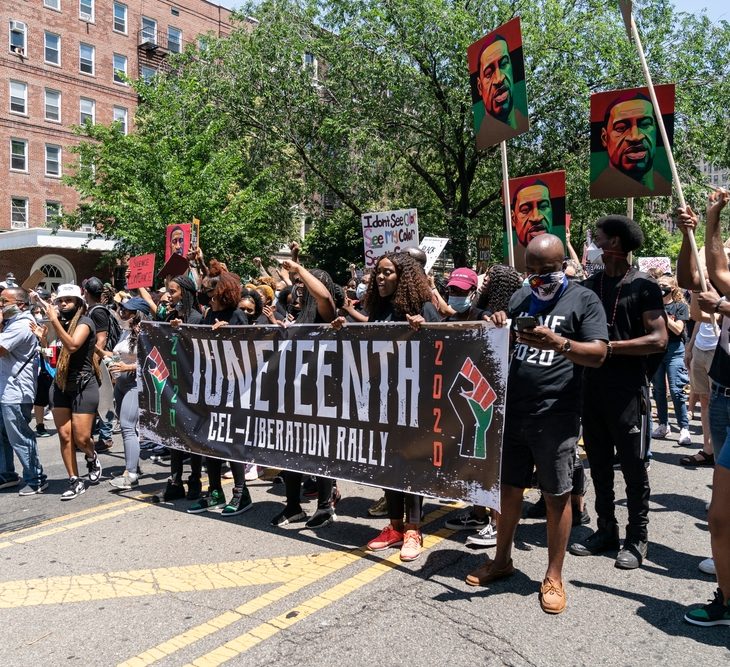Remembering Juneteenth for the Future
June 17, 2021

For this week’s Running Thread, I interviewed the Rev. Fred Davie, who has recently joined IFYC as Senior Advisor for Racial Equity. Our conversation included a personal reflection on the meaning of Juneteenth, how Black and Interfaith experiences are inextricably joined in American history, and how important Black Interfaith work is for the future of our nation — Tony Banout.
Tony: We are so excited to welcome you to the IFYC team. Your words and ideas have already opened my eyes to new possibilities in interfaith work. This is the second year IFYC has observed Juneteenth, and the nation seems to be moving towards universal adoption of Juneteenth as a national holiday. I’d love to hear more about how you understand the importance of Juneteenth.
Fred: Juneteenth was not a part of my growing up at all. I grew up in Belmont, North Carolina, in a place and time when Black people wanted to be seen as ‘loyal Americans’ not engaged in anything too radical. That may have been the influence of the church I grew up in and growing up in a predominantly white town.
However, it dawned on me recently that every year we would have a huge block party on a Sunday in June, right after church. All the black churches, with hundreds of people, would come to my aunts’ lawn, and I now realize that the older generation was celebrating Juneteenth without calling it Juneteenth. Now I view remembering and claiming the actual story of Juneteenth as necessary – the fact that people were kept enslaved for two years after they were technically freed. Juneteenth recognizes slavery, its legacy, and the struggle to claim the freedom that this nation declares that we have.
Tony: As you say, enslaved Black people in Texas remained in bondage, although legally, they were free. The lived reality of liberation sometimes lags far behind. How do you see the intersection between interfaith and the struggle for racial equity and justice today?
Fred: Those of us in the Black community have to remember that Black people of every faith were enslaved. Malcolm X reminded Black people: when they come for you, they don’t come for you because of your faith, but because you are black. Part of the genius of the Black Interfaith project at IFYC is that it recognizes Blackness first, – and then asks how you can use the black experience as the catalyst for interfaith conversations.
If I think back to my youth, the fact that Juneteenth couldn’t be celebrated shows how dangerous talking about race was – and is. It made me go back to look at the National Council of Christians and Jews – and the way they talked about inter-racial work was to talk about ‘brotherhood’ or interpersonal, in part because they understood the threat of talking honestly about race. The recent attack on Critical Race Theory shows how challenging it is for some to be honest when we talk about race. Hopefully Black Interfaith allows us to have a full conversation – to acknowledge slavery, and how long it took for Black people to be free, and how we have to continue to dismantle this legacy of racism. There is a role for all Black faith expressions to move America beyond the oppression, and Black Interfaith can speak into and be a resource for the wider interfaith space.
Tony: Half of the regions in Africa that enslaved people were taken from were majority Muslim, so historians believe that at least a third of the Africans brought to America were Muslims. What does this mean for the interfaith nature of the Black experience?
Fred: We must recognize the interfaith reality of Black life in America. The Africans who were brought here as chattel, almost all of them were brought here as non-Christians – Islam and indigenous African religions. If the interfaith world is going to take seriously Interfaith work in America, it has to take seriously the interfaith experience of Black people. We also have the opportunity and responsibility to build bridges between faith traditions within the Black community. That has not been done as intentionally as it might, and we are more prepared to do that now and withstand any attempts to undermine that work.
Tony: Fred, you are offering us a gift by talking about your own experiences of Juneteenth as a young person, and it strikes me that you are also at the forefront of social change now and have dedicated your life to the work of justice. I wonder what you’d name as the most urgent issues now. What is your great hope for how Interfaith work can advance racial equity in America?
Fred: The nation is in a power struggle for who will represent the people. Right now, a minority of people is setting the tone and direction for the country – just look at the makeup of the Senate. Although the popular vote was not close, the electoral college made the 2020 election very, very close. If 43,000 votes in three states had changed we would be having a very different conversation today. It’s really important for people of all faiths and no faith to join hands and stand against people who are engaged in life-destroying work. We are going to go through a dark period as we struggle for the soul of the nation, but through interfaith solidarity and especially the Black Interfaith movement, my hope is that we will get there together.
Share
Related Articles
Racial Equity
Racial Equity
Emancipation Days: The 20th of May, Juneteenth, and Why Both Matter
Interfaith Inspiration



